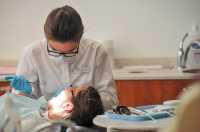AHA Journals, Author Interviews, Heart Disease, Surgical Research / 13.11.2018
Racial and Gender Disparities in CABG Surgery After First Heart Attack
MedicalResearch.com Interview with:
Dr. Srikanth Yandrapalli
New York Medical College
NYMC · Cardiology
MedicalResearch.com: What is the background for this study? What are the main findings?
Response: Selection of coronary artery bypass grafting over percutaneous coronary intervention during an acute myocardial infarction is influenced by the extent of coronary artery disease and patient comorbidities. Prior studies have shown sex and racial differences in coronary artery diseaseburden.
We sought to identify if there are any sex and racial differences in the utilization of coronary artery bypass grafting over percutaneous coronary intervention during a revascularized first acute myocardial infarction in the US.
We found that males had a higher coronary artery bypass grafting rate than women, and compared to Whites, Blacks had lower coronary artery bypass grafting rate and Asians had higher coronary artery bypass grafting at the time of a first myocardial infarction.
(more…)




